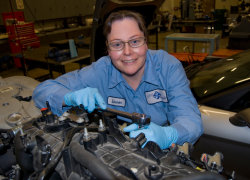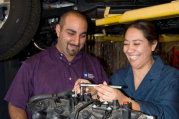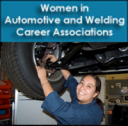Women's Success Stories
 |
Lauren Van Maren "Thereís nothing more empowering than knowing how your car works. Knowledge is power. Donít limit yourself. If it interests you, donít be afraid to explore it." |
Career Quick Look
| Salary: | $27-$32 per hour | Education: |
| Years in Field: | 21 years |
Las Positas College, A.S. in Automotive Technology; Also completed California state-approved apprenticeship program in automotive mechanics. |
| City/State: | Livermore, CA |
Getting Started: Lauren Van Maren was always interested in the cars her father collected. She recalls looking at the parts strewn about the garage as he worked on a valve job for his 1966 Mustang and wondering, “If I knew more, maybe I could help.” Her father was very supportive of her interest – at a time when the Equal Rights Amendment was often in the news, he told her, “If you want to make a man’s wage, you have to do a man’s job.” That stuck with her. “I’m very grateful to the all the women who went before me, working construction and things like that, because they really had a hard time. They paved the way,” says Lauren. When she was a senior in high school, she took an auto shop class through the Regional Occupational Program (ROP), and really enjoyed it. When she graduated, she enrolled in the Automotive Technology program at Las Positas College (LPC).
After she obtained her A.S. degree from LPC, she was hired on the evening shift as a contractor for Lawrence Livermore National Laboratory. She worked on the vehicle fleet, maintaining cars, trucks, tractors, trailers, and electric vehicles. After working from 3:30 p.m. to midnight as a contractor for a couple years, she applied for an apprenticeship program sponsored by the Lab, which enabled her to be hired on as a full-time employee there. Although there were no other women working in her department, there were many shop disciplines throughout the Lab, and she attended a weekly meeting of other tradeswomen to talk shop and share stories and support.
Education: Lauren attended automotive courses at Las Positas College and Chabot College in Hayward, and graduated with an A.S. degree in automotive technology from LPC. Although she was primarily interested in the automotive courses, an instructor urged her to take general education courses as well so she could obtain her A.S. degree. She has always been grateful that he encouraged her to aim higher and obtain a degree.
Lauren found that the classes built on one another, and inspired her interest. One of her teachers, Terry Johnson, required students to present what they knew on a topic, such as how the ignition system works. “We had to go up to the board in front of the 12 to 15 guys in the class. We would have to draw the ignition system and give a ten-minute talk about how it works.” Lauren found this difficult at the time, but says, “It gave me confidence and helped me to speak in front of people and so when I was at work and got called into the office I had a backbone. You have to be able to stand up for yourself. I got a lot out of that. Terry used to be an automotive mechanic, and he knew what it was like, what the frustrations were, so he knew what to do to build up our confidence.” She also enjoyed working on her own car during the program.
Once Lauren graduated, she continued her job in fleet maintenance at the Lawrence Livermore National Lab, eventually as a full-time employee with benefits. When the Lab later sponsored a state of California-approved apprenticeship program, Lauren returned to Las Positas College, taking evening classes for four additional years, completing her apprenticeship, and achieving journeyman status.
Greatest Professional Achievement: Lauren believes that her biggest accomplishment was to enter this field when few women were involved, and for sticking it out for over 20 years. “I’m still here, and I still get to do this,” she says. A related achievement is that she has continued to maintain her state licenses – smog, lamp, and brakes – and her Automotive Service Excellence (ASE) licenses and status as a master technician during this time. “I’m proud of that because they’re sort of a pain to get and keep up. They prove your competency in the trade.” says Lauren. The certificates are good for six years and then require renewal. She finds that the extra training keeps her current in the industry, especially with the high tech diagnostic work required as vehicles have become more highly controlled by computers. “That’s what they’re always looking for, people who can do diagnostics.”
Barriers: Lauren’s instructors were very supportive when she had difficulty getting comfortable with doing brake jobs at the Lab – a job that she didn’t do often enough to build up her skill level quickly. Her instructors encouraged her to practice the job multiple times in the shop until she got the hang of it. “They allowed me to just work on this thing for as long as I wanted to until I broke through.” The repetition boosted her confidence. “Now that I’m older I realize I’m not the only one who’s gone through this kind of stuff. I’ve worked with men who had trouble lifting equipment as well, but there are tools to help anybody, men or women, be able to do this job. For the few men who have been unsupportive throughout my career, there were many, many more that were helpful, accepting and treated me as an equal. Enjoy what you do. If you have a good attitude, it’ll spread throughout your shop,” she advises.
Working with Men: Lauren has learned quite a bit about working with men through the years. “Guys are kind of different. It took me a long time to figure that out. Guys relate differently.” She has noticed that sometimes teasing between her male co-workers can simply be their way of acknowledging her and one another, with no harm intended.
Advice for Women: Lauren advises women to consider their career options carefully. “I think it’s good to expand yourself. You don’t have to settle for a traditional job. You can get your feet wet in any career. You can take these classes at Las Positas, and then later you can decide to become something else if you want, like an air conditioning mechanic in a building,” says Lauren, who has noticed how the many skills she has learned can be applied in other settings. She learned a lot when she first started at the Lab from an older female air conditioning mechanic who got the women in the trades together to share stories and advice over lunch once a week. “She was my mentor,” says Lauren. “Don’t limit yourself. If it interests you, don’t be afraid to explore it.”
Typical Workday/Environment: Lauren works with a large fleet of vehicles at the Lawrence Livermore National Laboratory. Since there is little turnover in her group, she knows her co-workers well and enjoys the family atmosphere. Lauren works a day shift from 7 a.m. to 3:30 p.m. When she arrives in the morning, her first job is to take care of the hazardous waste from the previous day to minimize the waste stream from the Lab. She crushes the oil filters to compact them for deposit into a 55 gallon drum to be recycled. Then, she collects used oil for recycling. She also salvages brake fluids, gas, coolant, and other waste materials, which are each placed in different containers and logged.
Fleet vehicles, including cars, garbage trucks, large flat beds, tractors, trailers, and small electrical vehicles, are brought into the garage for maintenance each day by appointment. Lauren receives assignments from the service writer, who gives her a work order for each job detailing the work that needs to be done and the keys for the vehicle. Maintenance tasks may include oil changes, brake inspections, safety checks, tire checks and rotations, battery checks, and smog inspections. She also inspects each vehicle for oil leaks, lights that are out, broken wiper blades, and other defects. Each job has a suggested amount of time to complete, but Lauren finds the schedule at the Lab allows enough slack to assist a co-worker who needs help with a job. She prefers this to a dealership, where jobs must sometimes be performed on a flat rate. The work environment is a typical garage, with diagnostic test equipment, parts, and tools used for the jobs. A uniform service supplies automotive technicians with uniforms at the beginning of every workday, and takes them for cleaning at the end of the day.
Career Ladder: The benefits at this government facility are excellent. “There’s a line of guys for my job, that’s what I’ve learned going to classes,” says Lauren. Salaries for this position range from approximately $27 to up to $32 per hour for those with ASE licenses. Although supervisory jobs don’t come up often, she believes her experience would give her a head start in a range of other technical and mechanical disciplines such as air conditioning, working in a heavy equipment shop rebuilding pumps, working with electricity or hydraulics, rebuilding computers, or doing estimates in a body shop. “It touches on a lot of different fields,” says Lauren. “It’s a real fun trade.”
Professional Associations: Lauren belongs to the Automotive Technician Association in Hayward, which holds monthly meetings with interesting speakers. She has met nice colleagues in the group, and has also learned of valuable training opportunities.
Hobbies: Lauren loves going to book sales, and reading a variety of books related to her interests, which include history, travel, gardening, and golf, which she plays with her husband. She also has cats, and is interested in computers.
 Copyright 2010 National Institute for Women in Trades, Technology & Science | http://www.iwitts.com |


